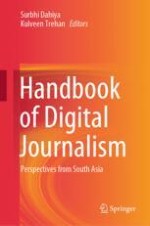2024 | OriginalPaper | Buchkapitel
43. What You See is What You Get: Invisibility, Spectacle and Media Literacy in the Age of Digital Media
verfasst von : Shashidhar Nanjundaiah
Erschienen in: Handbook of Digital Journalism
Verlag: Springer Nature Singapore
Aktivieren Sie unsere intelligente Suche, um passende Fachinhalte oder Patente zu finden.
Wählen Sie Textabschnitte aus um mit Künstlicher Intelligenz passenden Patente zu finden. powered by
Markieren Sie Textabschnitte, um KI-gestützt weitere passende Inhalte zu finden. powered by
